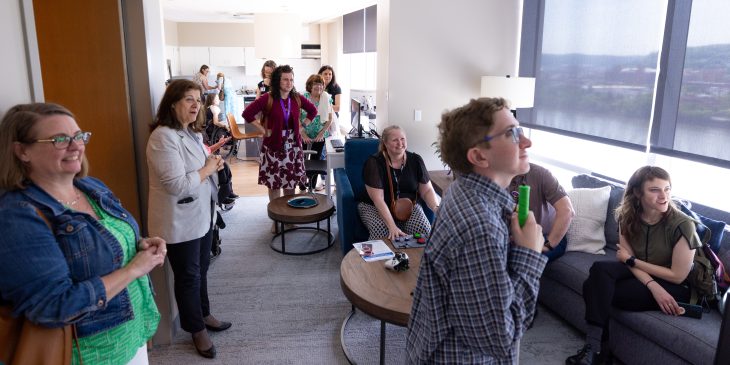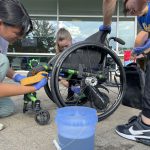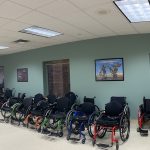Assist+ demonstrates UPMC’s commitment to patients “well beyond the care setting.”
How does a person with low vision know when their coffee cup is full?
How does a wheelchair user get to the beach?
How does someone with quadriplegia play video games?
The answer is found in assistive technology, which encompasses products and services to help people overcome challenges in their daily lives due to disability, injury, illness or aging. These devices can improve health, independence and quality of life.
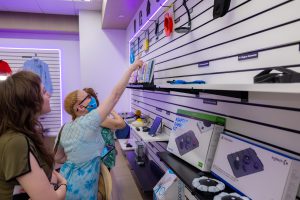
Visitors check out assistive technology products at the grand opening of Assist+ at Mercy Pavilion on May 21, 2024.
But assistive technology is often neglected, underfunded and inaccessible to many. Some products are not covered by insurance, leaving people to make these purchases before knowing if a product will suit their needs.
UPMC has launched the new Assist+ showcase located within the UPMC Mercy Pavilion in Pittsburgh.
“We have a whole range of products,” said Mitch Bell, M.S., a UPMC rehabilitation innovation specialist. “We have low-cost items that help with cooking, including different grips and different angles on knives. We have adaptive clothing with magnets instead of buttons that are easier to put on and take off. And we have high-tech adaptive gaming devices and technology to control your computer with your eyes, head movements or voice.”
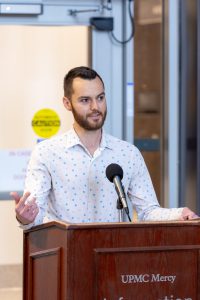
Mitch Bell, a rehabilitation innovation specialist at the UPMC Rehabilitation Institute, speaks at the grand opening of Assist+ on May 21, 2024.
Born with a physical disability in his left hand, Bell is no stranger to assistive technology. As a youngster, Bell sometimes had difficulty participating in childhood activities such as gripping monkey bars or closing a baseball glove.
“Thanks to my supportive family, friends and an inventive grandfather who could build anything, I never saw these as challenges,” Bell said. “Instead, they were opportunities to find or build something to make anything possible. This spirit lives on through Assist+, where we try to find or create a solution for any goal.”
Kenia Hernandez, a patient of the UPMC Adult Spina Bifida Clinic, was one of dozens of supporters who checked out the new Assist+ showcase at its recent grand opening.
Hernandez lives in a facility specifically designed for people with spina bifida, yet she was still astounded to see the variety of assistive products available to her.
“There’s so much more out there that I didn’t even know existed to help people with different disabilities,” she said. “I’m really glad that I came today.”
There are many ways for people to access the resources provided by Assist+. Providers can refer patients to Bell who will work with them to find the products they need. Providers can also collaborate with Assist+ so that patients can receive demonstrations and try specific products during clinical appointments.
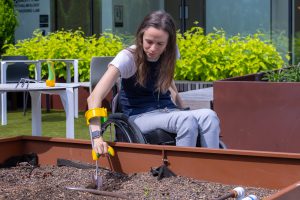
UPMC Rehabilitation Institute Research Association Liz Dunn demonstrates adaptive gardening equipment at the grand opening of Assist+ on May 21, 2024.
Additionally, the storefront is open to the public, so anyone can visit and explore the products on display. Assist+ provides information about how and where to purchase items, help to navigate insurance coverage and financial resources to help offset the cost.
“If we don’t have the product, we can still research it, talk with the company to get a demonstration, or mock-up examples with 3D printing to simulate the device,” said Bell.

UPMC Rehabilitation Institute Director Dr. Gwendolyn Sowa speaks at the grand opening of Assist+ on May 21, 2024.
“The resources available through Assist+ are indicative of UPMC’s commitment to helping individuals thrive well beyond the patient care setting,” said Dr. Gwendolyn Sowa, director of the UPMC Rehabilitation Institute.
“Our work does not end when a patient walks out the door. We know that with the right support, individuals can achieve their individual goals, whether that’s planning a beach vacation, cooking Thanksgiving dinner or getting back to the gym after an injury.”
Hernandez said it is important to recognize that people with physical limitations due to disability, aging or injury can still live full lives.
“We still do a lot of the same things as able-bodied people. We just do them differently,” she said.
Assist+ is open from 9 a.m. to 4 p.m., Monday through Friday at 1622 Locust St., Pittsburgh, Pa. 15219. Appointments are recommended by emailing assistplus@upmc.edu or by calling 878-261-6361.



